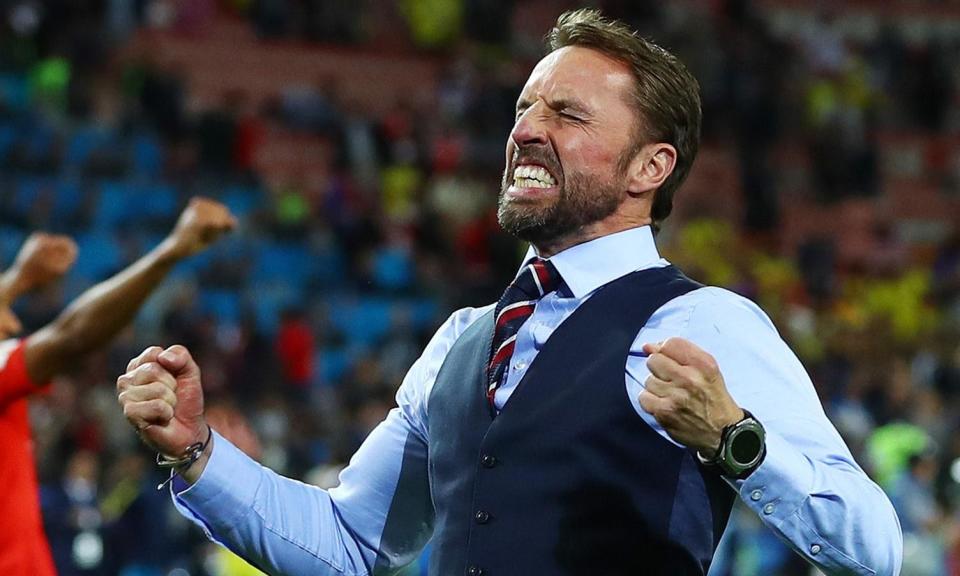England’s win shows you can shake off the past – and not just on the pitch
The nation’s new spiritual leader, Zen master and guide, Gareth Southgate, tells us not to get carried away, and we should surely heed his wisdom. We must not get overexcited, either with premature hopes of England winning the World Cup or – and this is a particular danger for those of us in the punditry business – with overanalysing the meaning of Tuesday’s penalty shootout victory over Colombia.
Instead we should repeat the obvious, feet-on-the-ground truths. That it was only one game. That we could be out by teatime on Saturday. And that, as Bhagwan Shree Southgate reminded us so sagely, the Swedes are “tough” opponents with a strong record against England.
With all that said, it’s hard not to see last night’s game as a small but telling twist in our national story. For the curious, maybe even defining, feature of postwar English identity has been an often unstable mix of arrogance and insecurity: a once-mighty imperial power, struggling to find its place in the world.
READ MORE: How the papers rejoiced in England’s triumph
READ MORE: England win a penalty shootout - World Cup diary
READ MORE: England erupts as the Three Lions reach World Cup quarter-finals
For half a century, the nation’s attitude to its football team has reflected that mix perfectly. The arrogance manifests itself in the unstated assumption that if there are international tournaments to be played, then England should be winning them; the insecurity in the self-deprecating, fatalistic certainty that we won’t. That mix is captured in the song that now rivals Jerusalem as the unofficial national anthem of England, the song that brought traffic to a standstill in parts of the country last night: Three Lions. It contains both the presumption that a trophy’s natural home is England, and the hurt at spending a lifetime watching it go elsewhere.
Now one small part of that narrative has been altered. England’s serial failure in the penalty shootout had become part of our national story of haplessness. The misses – whether by Stuart Pearce at Italia 90 against the Germans or by Southgate himself at Euro 96 against, once again, the Germans – entered the pantheon of collective uselessness, alongside Basil Fawlty and Mr Bean. We poked fun at ourselves over it – Southgate and Pearce mocked their own failures in a pizza commercial – but it left its imprint. Other countries were ruthless or efficient, but we were a bit rubbish. It became a law of nature. It would rain in summer and England would go out on penalties. You could set your watch by it.
Just before 10pm last night, that changed. There were several sub-plots to this shift in the storyline. Jordan Pickford, who was said to be too small to be a top goalkeeper, saved the day and became a hero. Kieran Trippier spoke of how England, who once seemed to improvise their way through shootouts against teams that were meticulously prepared, had trained again and again for this exact situation (though you have to hope the Swedes weren’t listening when Trippier said he always aims to put the ball in the exact same spot). And of course the emotional heart of the episode, Southgate himself – at last redeeming that miss 22 years ago.
As Newsnight’s Emily Maitlis tweeted: “Southgate has just proved what it is to understand past mistakes so well you turn them into future victory. It’s the stuff of proper mythology.”
READ MORE: England’s potential route to the final
READ MORE: Fans on Twitter couldn’t believe how ugly England v Colombia became
READ MORE: England banish penalty curse to suggest a new England is here
Indeed, it fell to the manager to make the crucial point. “We’re trying to write our own history,” he said, adding that he had told the players that: “They write their own stories. We don’t have to be bowed by the pressure of the past.”
There’s a national lesson there that goes beyond football, one all about possibility and shaking off the curse of fatalism. We should take it to heart and savour this moment. For who knows what lies in store when Saturday comes.
• Jonathan Freedland is a Guardian columnist

 Yahoo News
Yahoo News 


